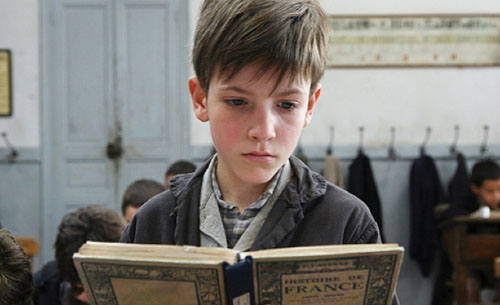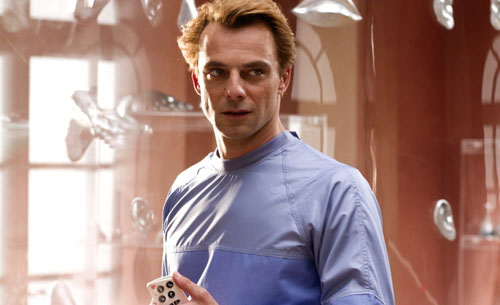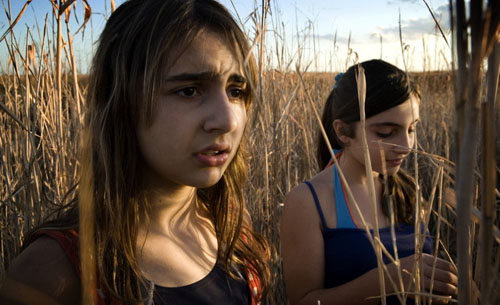New York: Open Roads 2013 New Italian Cinema
Written by: FFT Webmaster | June 24th, 2013
Ever since 2001 the Film Society of Lincoln Center has presented its annual Open Roads program with new Italian feature films. As in recent editions there is a strong regional trend in the 2013 selections including productions with a focus on Sicily and Sardinia. What is striking again is the wide range of artistic approaches and thematic issues addressing contemporary Italian issues and life styles. The program presented 12 productions including 2 documentaries from June 6 – 12 at New York’s Film Society of Lincoln Center.

Set in Algeria during the twenties and the struggle of independence during the fifties Gianni Amelio’s THE FIRST MAN is a superb semi-fictional auto-biography of Albert Camus, one of the best films in the program. There is a superb narrative structure establishing in frequent flashbacks the link between the experiences of young Camus and his return as an established critical writer during the French – Algerian war, searching for his roots and articulating opposition to colonialism. The photography, in its use of light and shadows is excellent, as is the seamless transition of the edits, the close ups, and selections of venues for the story. We encounter the characters shaping Camus’ sense of identity, an authoritarian grandmother ensuring survival in poverty, the instructor who fostered his education and independent spirit and his warm mother refusing to leave Algeria since she cannot live in a country without Arabs.

Pappi Corsicato’s THE FACE OF ANOTHER is a fast moving and media frenzied heavy handed Italian celebrity satire of an attempted insurance fraud involving cosmetic surgery. It may be appealing as an outrageous comedy but adds little to the art of Italian film making and was probably selected to show the wide range of contemporary approaches by Italian directors. Corsicato’s production contrasts sharply with the rather nuanced opening film EVERY BLESSED DAY. Its directory Paolo Virzi juxtaposes two characters in search of parenthood in this well scripted and plausible comedy. Guigo is an introspective philosophy student making a living as a hotel night clerk and his counterpart Antonia a passionate musician working for a car rental service. Their acting merits praise as do the colorful family and underground rock scene characters. From both aesthetic and thematic perspectives NINA by Elisa Furkas is a wonderful addition to recent outstanding Italian films. As the daughter of architects and a student of that discipline, Furkas backgrounds her film in carefully selected modernist architecture, balancing the action against neo classic al building. She demonstrates a superb sense of visual composition, framing and geometrical configuration enhanced by the mostly classical music sound track of the film. NINA does not have a straight action oriented story line. Rather we have an in-depth portrayal of a young woman living in solitude, confined to her world without clear direction and objectives. As the professor teaching her calligraphy puts it “you are not meant to do anything”. She has a fear of being like others who are driven by clear goals and social cravings. Her life shows only few reluctant social interactions and limited dialogues. Nina is an appealing drifter moving in a closed comfortable universe. Elisa Fukas succeeds in presenting a character symptomatic of post modern society, living in the present only with little overt concern for the future.

Nina comes from a different planet if we compare her upscale artistic settings to the backgrounds presented in two marvelous regional feature films Daniel Cirpri’s Sicilian opus IT WAS THE SON and Salvatore Mereu’s PRETTY BUTTERFLIES set in Sardinia’s capital Cagliari. In both features families in lower class slum settings are shown in a rather realistic fashion sometimes bordering on the grotesque, absurd and surreal. In the first film a boy is willingly framed for shooting his father by his grandmother since the true killer, a mafia connected cousin, will be able to take care of the family. Starting as a comedy with slightly overdrawn characters in a dilapidated housing project, the film ends like a satirical drama. The father dies after an argument over his scratched Mercedes, acquired through a settlement after the accidental mafia killing of his daughter. Undoubtedly the family depicted is dysfunctional yet survival family bonds prevail. The power of family transcends its underclass setting. Cipri directs a character driven story with strong theatrical overtones which may be typical in that Mediterranean setting. There is impressive camera work and outstanding acting, yet Cipri somehow seems to be detached from the characters he depicts so well. Nonetheless, the film is an impressive achievement. In PRETTY BUTTERFLIES, 12 year old Caterina lives with many siblings and a tyrannical father in a rundown slum neighborhood in Cagliari. She provides a running commentary of her attempts to break out of her setting and seems to overcome misery and poverty with a boundless optimism. Lensed in an appealing semi-documentary style the film covers one day in her life, her many adventures in the neighborhood, her trip to the beach with her friend Luna and their passage through Cagliari. The film has a fairy tale ending, though complete with car chases, shooting, and robbery . A friendly witch predicts a better future. PRETTY BUTTERFLIES is among the best of the Open Roads selection with a formidable performance by Sara Podda as Caterina.
Overall, Open Roads delivers on its promise of introducing noteworthy current Italian productions to the New York public. How many of these films will find a larger audience remains to be seen.


